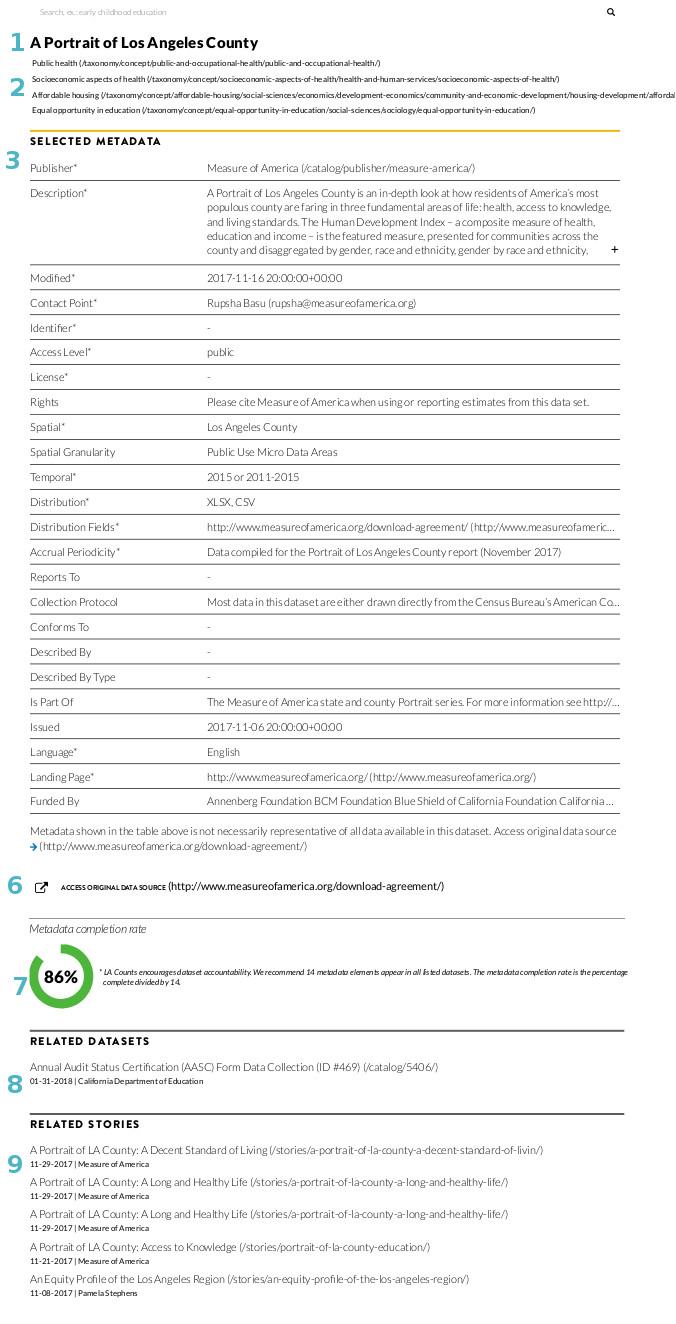Apps¶
Datasets¶
Track other machine readable APIs or wrap flat urls into a DCAT compatible system.
Provides a performant text search index backed with elasticsearch. Searches can be filtered geo-spatially, by tags, by date, or by scalar values (ie duration, completion %).
Internal models are adapted from https://github.com/compilerla/los-angeles-data-sources and are harmonized with the DCAT standard.
Catalog Record¶
Referred to as “dataset” in design but W3C DCAT disambiguates CatalogRecord from Dataset. https://www.w3.org/TR/vocab-dcat/ From the spec itself:
Notice that while dcat:Dataset represents the dataset itself, dcat:CatalogRecord represents the record that describes a dataset in the catalog. The use of the CatalogRecord is considered optional. It is used to capture provenance information about dataset entries in a catalog.
By introducing CatalogRecord the system is able to differentiate between self-reported metadata (provided from Sync) and curated metadata. CatalogRecord is the curated source of truth and is required for inclusion into the catalog.
Records also have a state which can control their visibility in the catalog. Only a CatalogRecord with a state of PUBLISHED is displayed and indexed!
Detail View¶
- Title - The given title of the CatalogRecord
- Tags - A list of SKOS Concepts
- Selected Metadata - Displays field values associated to the CatalogRecord. If no value is provided, the associated Dataset is consulted.
- [DISABLED] Columns - Displays the known dataset columns
- [DISABLED] Definitions - Displays the definitions of concepts associated through tags and columns
- Access Original Data Source - The first non-empty value from: distribution_fields, identifier or landing_page
- Metadata completion rate - A percentage value of the completion, computed by default but may be overridden with percentage_complete
- Related Datasets - PUBLISHED Datasets within the same Tag structure / sharing SKOS Concepts; Or shared spatial entity; Or Shared publisher depending upon quantity.
- Related Stories - PUBLISHED Stories within the same Tag structure / sharing SKOS Concepts
- [DISABLED] Linked Stories - Lists stories explicitly linked to this CatalogRecord

Commands¶
| detect_dataset_sync_stategy: | |
|---|---|
| Automatically detects which sync strategy to use on unassigned catalog records. | |
| geocode_spatial_entries: | |
| Creates spatial entities for catalog records that specify a spatial value | |
| import_googlesheet_datasets: | |
| Imports datasets from a Regional Data Inventory google spreadsheet. | |
| sync_catalog_record: | |
| Syncs a catalog record(s) using the dataset’s API. Upon successful synchronization the CatalogRecord is PUBLISHED. | |
detect_dataset_sync_stategy & sync_catalog_record run nightly.
Sync¶
apps.datasets.sync is a submodule for syncing datasets with various strategies.
Sync strategies should not modify the CatalogRecord but will modify or delete associated Metadata/DCAT models:
- Dataset
- RecordColumn
- Distribution
Populating Dataset provides the detail page with metadata values if the CatalogRecord has none.
The following sync strategies exist:
- apps.datasets.sync.socrata
- apps.datasets.sync.static_link
- apps.datasets.sync.arcgis
Each CatalogRecord has a field sync_strategy to specify which function to use.
Focus¶
Provides a topic-based view of the catalog by providing a Simple Knowledge Organization System: https://www.w3.org/TR/skos-primer/
Related datasets & stories is done by including all descendant concepts to include items that are conceptually related.
CatalogRecord s can be organized into Focus Areas & Concepts.
- stories & records are manually assigned to concepts
- focus areas are a curated display of stories & records with a primary linked concept
Concept¶
A Directed Acyclic Graph (DAG) representing linked concepts. The DAG structure allows for efficient querying of concept descendants.
Commands¶
| create_concepts_from_collections: | |
|---|---|
| Create a concept entry for each curated collection and add the datasets. | |
| import_skos_vocabulary: | |
| Imports a W3C SKOS (Simple Knowledge Organization System) rdf vocabulary file. | |
| populate_tags_from_concepts: | |
| All concepts will generate a tag and associate itself to any tags matching its various names. Datasets with tags associated to concepts will have their concept associations updated. | |
Commenting¶
Using django-comments-xtd
Stories¶
Custom blog that allows users to post stories (from the front end, permission based).
Allows for links to publisher, datasets, stories, tags.
Multiple images may be attached and body is a rich text editor (CKeditor).
Stories also have a state which can control their visibility in the catalog. Only a Story with a state of PUBLISHED is displayed and indexed!
Profiles¶
Defines a custom user model. Stores the following fields:
- Display name
- title
- organization (text)
- publisher (foreign key to a registered publisher)
- url/website
- marked interests
- avatar
Allows users to save or track recent views of:
- searches
- datasets
- stories
django-activity-stream for tracking views and saves